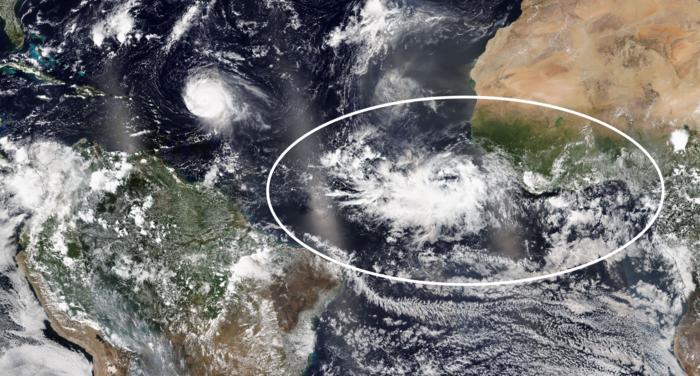Miami, FL – In a groundbreaking meteorological study, an international team of researchers from the University of Miami Rosenstiel School of Marine, Atmospheric, and Earth Science, the European Centre for Medium-Range Weather Forecasts (ECMWF; Reading, UK), and the National Center for Atmospheric Research (NCAR; Boulder, CO) are improving scientific understanding of atmospheric waves in the tropics, including how they impact extreme weather events like hurricanes and heavy rainfall.

Credit: NASA Worldview.
Miami, FL – In a groundbreaking meteorological study, an international team of researchers from the University of Miami Rosenstiel School of Marine, Atmospheric, and Earth Science, the European Centre for Medium-Range Weather Forecasts (ECMWF; Reading, UK), and the National Center for Atmospheric Research (NCAR; Boulder, CO) are improving scientific understanding of atmospheric waves in the tropics, including how they impact extreme weather events like hurricanes and heavy rainfall.
The collaborative research team focused on a specific type of atmospheric wave, known as Convectively Coupled Kelvin Waves, (CCKWs), which are massive waves over 1,000-miles long that travel in Earth’s atmosphere along the equator and significantly influence global rainfall patterns. The study, published June 1, 2024, in the American Geophysical Union’s Journal of Advances in Modeling Earth Systems, provides researchers with a new way to study the behavior and attributes of these Kelvin waves in weather forecast models.
“Our findings suggest that improving the simulation of these Kelvin waves in weather models could enhance the accuracy of predictions for other high-impact weather features,” said Quinton Lawton, a recent graduate of the Rosenstiel School’s Department of Atmospheric Sciences and a lead author of the study. “This has the potential to provide communities, especially those in tropical regions, with more lead time and readiness for destructive weather.”
Utilizing NCAR’s high-performance computing system and cutting-edge weather models including the Model for Prediction Across Scales – Atmosphere (MPAS-A) and ECMWF’s Integrated Forecast System (IFS), the team simulated several Kelvin waves from 2021. One notable Kelvin wave over the Atlantic Ocean was linked to the formation of Tropical Storm Victor.
The study found that current weather forecast models poorly simulated an Atlantic Ocean CCKW, indicating a need for future improvements in weather forecasting systems to better predict these waves and, consequently, other extreme weather events.
The researchers introduced a novel methodology for modifying the strength of Kelvin waves in weather forecast models. With this new tool, researchers will be able to better quantify the characteristics and impacts of Kelvin waves, enhancing our understanding of how these waves are represented in weather forecast models.
Kelvin waves are now recognized for their role in increasing the likelihood of hurricane formation and triggering extreme rainfall events. In a previous study by Rosenstiel School scientists Lawton and Sharan Majumdar published in 2023, they explain how these waves can encourage tropical cyclone formation in the Atlantic.
This study represents the culmination of two years of collaborative research, originating from the lead student author’s PhD dissertation at the University of Miami. The work brings together expertise and resources from UM, NCAR, and ECMWF to push the boundaries of meteorological science.
“The research is a step towards better understanding and predicting the tropical atmosphere,” said study coauthor Sharan Majumdar, a professor of atmospheric sciences at the Rosenstiel School. “The study also highlights the need for further research into why current models struggle with accurately simulating these waves.”
Journal
Journal of Advances in Modeling Earth Systems
Method of Research
Experimental study
Subject of Research
Not applicable
Article Title
The Representation of Convectively Coupled Kelvin Waves in Simulations With Modified Wave Amplitudes
Article Publication Date
1-Jun-2024
COI Statement
none



